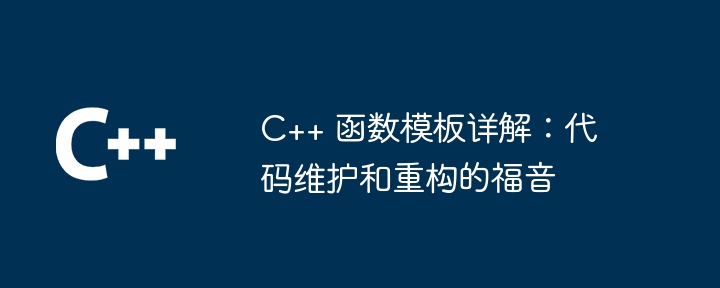
Function templates are a mechanism in C for writing reusable code regardless of the actual type of data. This helps with code maintenance and refactoring. Advantages include: Code reuse: Write functions that can be used on different types of data. Simple maintenance: changing function behavior requires only changing the template, not each implementation. Consistency: Ensure function behavior is consistent across all data types.

Function templates are a powerful mechanism in C that allow you to write reusable code, regardless of the actual type of data. This is very helpful for code maintenance and refactoring.
The syntax of the function template is as follows:
templatevoid my_function(T a, T b) { // ... }
Where:
T aandT bare parameters of the function template.Consider the following function, which calculates the minimum value of two numbers:
int min(int a, int b) { if (a < b) { return a; } else { return b; } }
You can use function templates to generalize this function as follows:
templateT min(T a, T b) { if (a < b) { return a; } else { return b; } }
Now, this function can be used with any type of number (such asint,floatordouble).
Function templates make code maintenance and refactoring easier. For example, if you need to add a min function for another type, you don't need to write a new function. You just need to change the type parameter in the function template to the desired type.
// 为 float 类型计算最小值 float min_float(float a, float b) { return min(a, b); }
What are the benefits of using function templates:
Function templates are a powerful tool in C for achieving reusable, maintainable, and consistent code. They are especially useful for writing general-purpose libraries and frameworks.
The above is the detailed content of Detailed explanation of C++ function templates: the gospel of code maintenance and refactoring. For more information, please follow other related articles on the PHP Chinese website!
 What are the differences between c++ and c language
What are the differences between c++ and c language Recommended learning order for c++ and python
Recommended learning order for c++ and python Cost-effectiveness analysis of learning python and c++
Cost-effectiveness analysis of learning python and c++ Is c language the same as c++?
Is c language the same as c++? Which is better to learn first, c language or c++?
Which is better to learn first, c language or c++? The difference and connection between c language and c++
The difference and connection between c language and c++ C++ software Chinese change tutorial
C++ software Chinese change tutorial Cost-effectiveness analysis of learning python, java and c++
Cost-effectiveness analysis of learning python, java and c++



